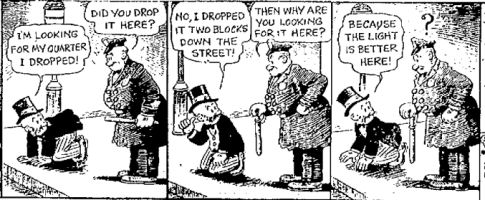Everyone is looking for the lost key under the lamppost…
The current state of humanity is: no one is looking…
Instead, if they do anything, they try to think it out.
It is like trying to think out soup… no ingredients, none.
The only way to be effective in life is through looking IN REALITY, where the ingredients are… and not just for soup, but for everything.
The Streetlight Effect
The streetlight effect is a type of observational bias where people only look for whatever they are searching by looking where it is easiest. The search itself may be referred to as a drunkard’s search.
Taken from an old joke about a drunkard who is searching for something he has lost, the parable is told several ways but typically includes the following details:
A policeman sees a drunk man…
…searching for something under a streetlight and asks what the drunk has lost. He says he lost his keys and they both look under the streetlight together. After a few minutes the policeman asks if he is sure he lost them here, and the drunk replies, no, and that he lost them in the park. The policeman asks why he is searching here, and the drunk replies, ‘this is where the light is.’
David H. Freedman apparently coined the phrase ‘streetlight effect,’ but the story and concept were used in the social sciences since at least 1964, by Abraham Kaplan, where he refers to this as ‘the principle of the drunkard’s search’
Science is divided. There are the Creationists who say that god created the universe, designed everything and all we can do is go with it.
And then there are the scientists who say: man is a machine, life is an accident, and their inquiry and methods are consistent with this context.
As you may notice, I am not going to support or argue with either of them: both of them are theories from the limited perspective of the human mind. They all look under the streetlight.
What I am intending to talk about is what both miss.
Although in my coaching practice I see it clearly that NO ONE IS LOOKING… even when all the pieces they should look for are on the board… they look inside, in their minds… supposing that the answer to any question is there… ugh… talk about ineffectiveness…
But the difference between the two camps is most visible, when they talk about intrinsic motivation.
That small part, or aspect of a human that isn’t connected to the mind, isn’t connected to anything physical.
Call it the spirit, the spark, the divine part of a human. It shines through the eyes of a child, and then slowly dims in most people…
That part that knows that you are imbued with something that doesn’t come from the survival game of the genes, from the horizontal plane of dog eat dog world.
That you are in the world but not of the world
But it is also not part of the ‘positive thinking’, pious, all mind stuff. It is NOT mind. It is not even brain. Not thinking. It is what can be called Consciousness.
It is what can be
Read the rest of the article


